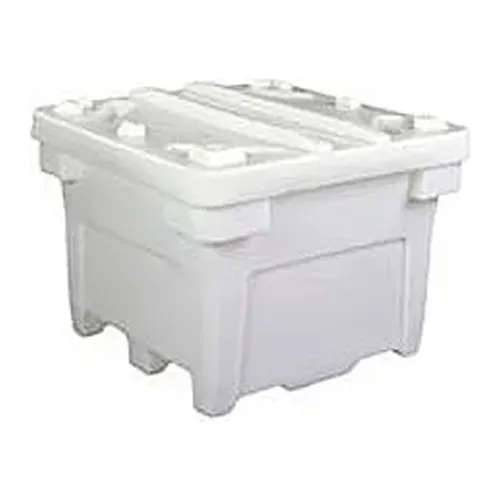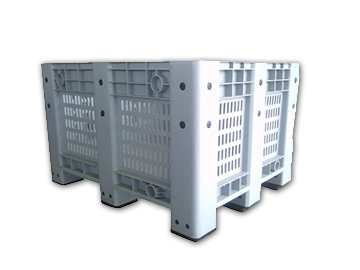The Function of Bulk Plastic Containers in Effective Recycling Practices and Sustainability
Mass plastic containers are integral to modern-day recycling initiatives. Their layout boosts the effectiveness of product collection and transport, adding to sustainability goals. These containers not just optimize space however also aid in keeping an eye on contamination levels. Nevertheless, their execution is not without obstacles. Understanding the full range of their effect exposes a complicated partnership in between logistics and ecological obligation that requires additional expedition.
Understanding Bulk Plastic Containers
Bulk plastic containers act as a necessary component in numerous markets, helping with the storage and transportation of items. These containers are usually made from durable materials such as high-density polyethylene (HDPE) or polypropylene, which give sturdiness and resistance to environmental variables. Their style typically includes functions like stackability and modularity, enabling effective usage of area throughout both storage and transportation.
Industries such as agriculture, food handling, and manufacturing often utilize mass plastic containers because of their light-weight nature and convenience of handling. The containers come in different dimensions and arrangements, accommodating the specific demands of various items. Their flexibility prolongs past plain functionality; they can additionally be customized with covers, manages, and identifying options to improve use - Bulk Plastic Containers. Because of this, mass plastic containers play a critical duty in optimizing logistics and supply chain procedures across numerous markets, consequently contributing to general effectiveness and cost-effectiveness
Benefits of Making Use Of Bulk Plastic Containers in Recycling
When companies focus on reusing initiatives, the usage of bulk plastic containers substantially enhances the performance of the procedure. These containers are created to enhance room, enabling the storage and transportation of larger quantities of recyclable products. This leads to less trips to recycling centers, thus decreasing fuel consumption and associated emissions.
Furthermore, mass plastic containers are immune and durable to different environmental factors, ensuring that products remain shielded throughout handling and transit. Their light-weight layout even more adds to decrease transportation expenses.
The harmony of these containers assists in far better sorting and handling of recyclable products, which can enhance overall recycling rates. Organizations that embrace bulk plastic containers also demonstrate a commitment to sustainability, positively affecting their brand name picture. Eventually, these advantages not only simplify recycling techniques but also contribute to wider ecological goals
Exactly How Mass Plastic Containers Facilitate Material Collection
Effective product collection is significantly boosted by the use of bulk plastic containers, as they supply a efficient and organized solution for collecting recyclable things. These containers are designed to fit large quantities of products, which simplifies the sorting and storage procedure. Their stackable layout takes full advantage of space usage, making it easier for centers to organize recyclables without mess.
Furthermore, mass plastic containers are weather-resistant and durable, enabling exterior positioning without degradation. This durability guarantees that materials stay safeguarded until they are collected for handling.

The uniformity in dimension and shape of these containers assists in standardization across collection factors, allowing far better monitoring of recyclable quantities. Their transparent nature permits for simple presence of contents, assisting in the surveillance of contamination degrees and guaranteeing that only appropriate materials are accumulated. Overall, bulk plastic containers play a critical function in simplifying the material collection procedure, consequently advertising reliable recycling techniques.
Transport Efficiency and Environmental Effect
Transportation effectiveness plays a crucial duty in the recycling procedure, especially via the optimization of lots capability wholesale plastic containers. By maximizing the quantity of product moved, firms can substantially reduce the variety of journeys called for, consequently reducing their carbon impact. This technique not only improves operational efficiency however also adds to a lot more lasting environmental practices.
Optimizing Tons Capability
Although maximizing load ability is often neglected, it plays a vital function in improving transport effectiveness and decreasing environmental influence in recycling practices. By taking full advantage of the quantity that mass plastic containers can hold, recycling operations can minimize the variety of trips needed for transport. This not just lowers fuel usage but likewise reduces the wear and tear on vehicles. Reliable load administration enables facilities to make use of room successfully, ensuring that each transport cycle is as productive as feasible. In addition, well-optimized loads can cause better arrangements with logistics suppliers, potentially lowering overall prices. Eventually, improving lots capacity contributes to a more sustainable reusing system by cultivating reliable source use and decreasing waste produced during transportation.
Reducing Carbon Footprint
As recycling procedures undertaking to reduce their ecological influence, minimizing the carbon footprint connected with transport becomes an essential goal. Bulk plastic containers play a vital role in accomplishing this goal by improving tons performance and maximizing logistics. Their light-weight yet durable style permits optimum freight area usage, decreasing the variety of trips required to transport materials. By consolidating shipments, recycling centers can reduce gas usage and greenhouse gas emissions. Additionally, strategically locating recycling facilities reduces transportation ranges, furthermore lowering carbon outcomes. Utilizing fuel-efficient cars and different energy sources improves total sustainability. By integrating these methods, the recycling sector can significantly reduce its carbon impact, adding to a much more lasting future.
Challenges in making use of Mass Plastic Containers

Contamination Concerns
Contamination concerns represent a substantial difficulty in the effective use of bulk plastic containers within recycling practices. These containers often accumulate deposits from previous components, bring about combined products that can hinder the recycling process. Pollutants such as food waste, chemicals, or non-recyclable materials can compromise the honesty of the entire batch, causing raised disposal prices and lowered reusing rates. Additionally, inappropriate cleaning or sorting can worsen these problems, making it tough for recycling facilities to process materials successfully. The presence of pollutants not just affects the top quality of recycled products however likewise threatens the overall sustainability efforts focused on decreasing plastic waste. Addressing these contamination challenges is essential for boosting the efficiency of mass plastic container recycling.
Recycling Infrastructure Limitations
Inadequacy in recycling infrastructure postures significant difficulties for the reliable monitoring of bulk plastic containers. Many recycling facilities do not have the capacity to refine huge quantities of these containers successfully, resulting in enhanced prices and hold-ups. Inadequate arranging modern technologies typically lead to contamination, as bulk containers might be mixed with other materials, making complex the reusing process. Restricted transportation click to find out more choices additionally impede the movement of mass plastic containers to appropriate reusing facilities, bring about enhanced landfill waste. In addition, an absence of standard protocols for bulk container reusing develops complication among services and consumers, further complicating efforts to promote sustainability. Resolving these framework limitations is essential to enhance recycling methods and make best use of the possibility of bulk plastic containers in a Your Domain Name round economy.
Best Practices for Carrying Out Bulk Plastic Containers
They need to focus on a critical approach that improves efficiency and reduces contamination threats when companies take into consideration implementing bulk plastic containers in their reusing practices. First, choosing the suitable container size and type is vital to accommodate the volume of products being refined. Organizations should additionally develop clear labeling and signage to lead customers on appropriate disposal approaches, minimizing confusion and errors. Routine training sessions for staff can additionally strengthen these practices, making certain everybody understands their duties in preserving reusing honesty.
Additionally, organizations need to carry out a routine maintenance schedule to examine and clean containers, stopping the build-up of impurities. Partnering with regional reusing centers can additionally improve the collection procedure, making sure that materials are properly refined. Companies ought to monitor and examine their reusing metrics, utilizing this data to improve practices over time and promote continuous improvement in their sustainability efforts.
The Future of Mass Plastic Containers in Sustainable Practices
As companies progressively focus on sustainability, the role of bulk plastic containers in reusing practices is set to progress substantially. Developments in products scientific research are resulting in the growth of recyclable and eco-friendly alternatives, improving the environmental advantages of bulk plastic containers. In addition, the application of closed-loop systems will certainly enable for less complicated collection and repurposing of these containers, minimizing waste and source usage.
Technical innovations, such as wise radar, will certainly make it possible for business to keep track of the lifecycle of bulk containers, boosting efficiency in reusing procedures. As customer need for sustainable techniques grows, companies will likely adopt mass plastic containers made for reuse and long-lasting value. Furthermore, cooperation between markets and governments will foster the establishment of standard reusing methods, ensuring that bulk containers are efficiently integrated right into more comprehensive sustainability efforts. In general, the future of mass plastic containers appears encouraging, with significant capacity for contributing to a round economy.
Often Asked Questions
How Are Mass Plastic Containers Made and What Materials Are Used?
Mass plastic containers are normally made from high-density polyethylene (HDPE) or polypropylene (PP) These products are processed with injection molding or blow molding techniques, resulting in resilient, lightweight containers ideal for various storage and transport requirements.
Can Mass Plastic Containers Be Recycled Numerous Times Before Recycling?
Yes, bulk plastic containers can be recycled multiple times prior to recycling. Their longevity and design permit for repeated usage in numerous applications, advertising sustainability and source effectiveness while minimizing the demand for brand-new containers.

What Qualifications Exist for Bulk Plastic Containers in Recycling?
Different certifications for mass plastic containers consist of the Recycling Collaboration's certification, the Cradle to Cradle Licensed ™ requirement, and the Sustainable Product packaging Union's standards, ensuring containers satisfy details ecological and recyclability requirements for efficient recycling.
Exactly How Do Bulk Plastic Containers Contrast to Other Recycling Storage Options?
Mass plastic containers provide better longevity and ability contrasted to other reusing storage options, like it reducing the danger of contamination and helping with efficient transport. Their style sustains far better company, enhancing total efficiency in reusing operations.
What Is the Lifespan of a Mass Plastic Container in Recycling Processes?
The life-span of a bulk plastic container in reusing processes usually varies from 5 to 10 years, depending upon use, material high quality, and environmental conditions, enabling multiple cycles of use before eventual disposal or recycling.
When organizations prioritize recycling efforts, the utilization of mass plastic containers considerably improves the effectiveness of the process. Transportation performance plays a crucial role in the recycling procedure, especially via the optimization of tons ability in bulk plastic containers. The use of mass plastic containers in recycling techniques encounters significant challenges, specifically concerning contamination concerns and limitations within reusing infrastructure. Contamination concerns stand for a considerable difficulty in the effective use of mass plastic containers within recycling practices. When companies consider implementing bulk plastic containers in their recycling practices, they ought to focus on a calculated technique that boosts efficiency and minimizes contamination threats.